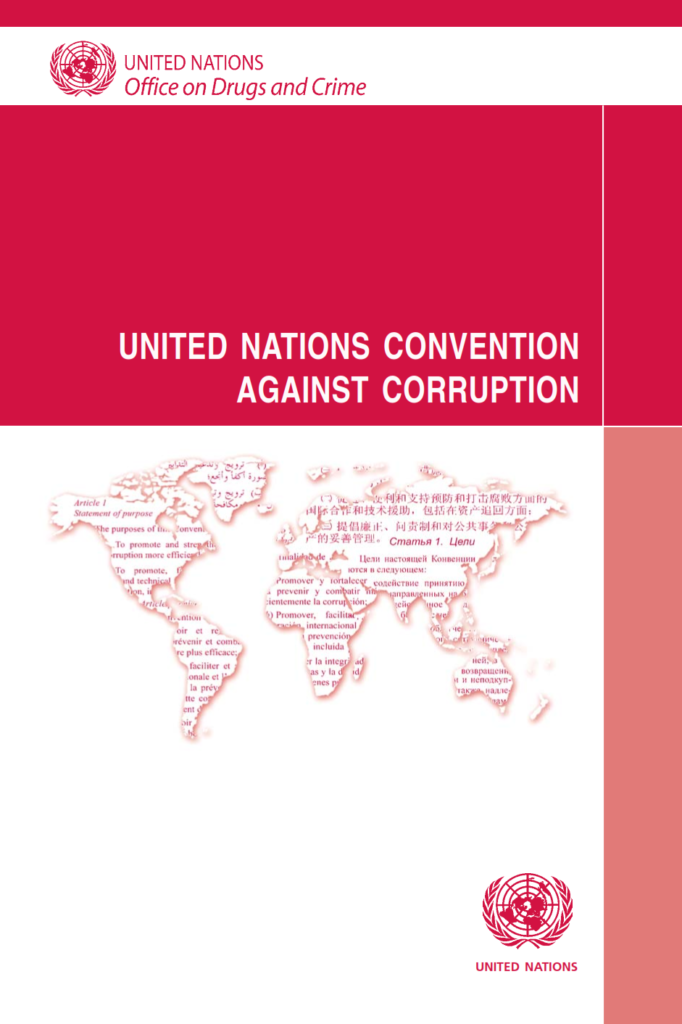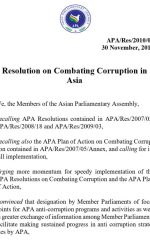Regional and International Agreements
This page is a starting point for information on important agreements related to various aspects of anti-corruption, both at the international level and within Southeast Asia.
The United Nations Convention against Corruption
The United Nations Convention against corruption came into force on 14 December 2005, signed by 140 counties and ratified by 189 countries. It covers many aspects of accountability and transparency, covering five main areas: prevention, law enforcement, international cooperation, recovery of assets, exchange of information and technical assistance. The website includes a ratification/status page.
The Convention’s far-reaching approach and the mandatory character of many of its provisions make it a unique tool for developing a comprehensive response to a global problem. The Convention covers many different forms of corruption, such as bribery, trading in influence, abuse of functions, and various acts of corruption in the private sector.
Together with governments, policy makers and citizens, the UN Office of Drugs and Crime ( UNDOC) works on establishing evidence-based international standards and finding solutions to a range of social, economic and environmental challenges. From improving economic performance and creating jobs to fostering strong education and fighting international tax evasion, we provide a unique forum and knowledge hub for data and analysis, exchange of experiences, best-practice sharing, and advice on public policies and international standard-setting
United Nations Convention against Transnational Organized Crime and the Protocols
This convention entered into force on the 29th of September 2003, adopted by General Assembly resolution 55/25 of 15 November 2000 in Palermo, Italy. It is the main international instrument in the fight against transnational organized crime. The Convention is further supplemented by three Protocols, which target specific areas and manifestations of organized crime: the Protocol to Prevent, Suppress and Punish Trafficking in Persons, Especially Women and Children; the Protocol against the Smuggling of Migrants by Land, Sea and Air; and the Protocol against the Illicit Manufacturing of and Trafficking in Firearms, their Parts and Components and Ammunition. Countries must become parties to the Convention itself before they can become parties to any of the Protocols. States that ratify this instrument commit themselves to taking a series of measures against transnational organized crime, including the creation of domestic criminal offences (participation in an organized criminal group, money laundering, corruption and obstruction of justice); the adoption of new and sweeping frameworks for extradition, mutual legal assistance and law enforcement cooperation; and the promotion of training and technical assistance for building or upgrading the necessary capacity of national authorities.
The United Nations Declaration against Corruption and Bribery in International Commercial Transactions
This is a political commitment does not have the force of law but, adopted by U.N. in December 1996. It invites UN Member States to take appropriate measures and cooperate at all levels to combat corruption and bribery in international commercial transactions. It requests the UN Economic and Social Council and its subsidiary bodies, in particular the Commission on Crime Prevention and Criminal Justice: (a) to examine ways without in any way precluding, impeding or delaying international, regional or national actions, to further the implementation of the present resolution and the annexed Declaration; (b) to keep the issue of corruption and bribery in international commercial transactions under regular review; (c) to promote the effective implementation of the present resolution; encourages private and public corporations, including transnational corporations, and individuals engaged in international commercial transactions to cooperate in the effective implementation of the Declaration.
ASEAN Declaration on Transnational Crime (1997)
This declaration comes from the first ASEAN Conference on Transnational Crime held in Manila on 18-20 December 1997. It does not have the force of law, but expresses the commitment of the ASEAN Ministers of Interior/Home Affairs and Representatives of ASEAN Member Countries in attendance to address the pernicious effects of transnational crime, such as terrorism, illicit drug trafficking, arms smuggling, money laundering, traffic in persons and piracy on regional stability and development, the maintenance of the rule of law and the welfare of the region’s peoples.
Manila Declaration on the Prevention and Control 1998
This declaration comes from the Ministers and Representatives of the States participating in the Asia Regional Ministerial Meeting on Transnational Crime, held at Manila, Philippines, from 23 to 25 March 1998, organized by the United Nations Centre for International Crime Prevention, with the Government of the Philippines acting as the Host. Lacking the force of law, the declaration reflects the purpose to the Meeting, which was assembled for the purpose of promoting regional and international cooperation to combat transnational crime and to devise modalities to improve the capacity of ASEAN Member States to respond to it more effectively.
Resolution on Combating Corruption in Asia
APA/Res/2010/01
|30 November, 2010
Resolution on Combating Corruption in Asia
We, the Members of the Asian Parliamentary Assembly,
Recalling APA Resolutions contained in APA/Res/2007/05, APA/Res/2008/18 and APA/Res/2009/03, Recalling also the APA Plan of Action on Combating Corrup- tion contained in APA/Res/2007/05/Annex, and calling for its full implementation,
Urging more momentum for speedy implementation of the APA Resolutions on Combating Corruption and the APA Plan of Action,
Convinced that designation by Member Parliaments of focal points for APA anti-corruption programs and activities as well as greater exchange of information among Member Parliaments facilitate making sustained progress in anti corruption strate- gies by APA,





